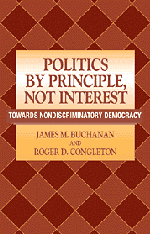PART THREE - APPLICATION
Published online by Cambridge University Press: 27 March 2010
Summary
Introduction
As noted at the beginning of Chapter 2, we have considered it necessary to engage in “ideal theory” in order to establish the analytical foundations for the book's whole enterprise. We make no apologies for the use of the highly stylized, grossly simplified, and extremely abstracted models that have informed the preceding four chapters. We have sought to secure a generalized understanding of the generality principle before plunging into the complexities that any effort at application must introduce.
With Chapter 6, however, we move, perhaps abruptly, beyond reductionist exercises. In this and the following chapters in Part Three, we discuss familiar subject matters: externality, regulation, taxation, deficits, public goods, transfers, social insurance, and federalism. These policy-relevant categories of modern political economy offer the menu for application of the normative analysis of Part Two.
As the separate treatments will make clear, difficulties emerge in each case if we expect application of the generality norm to yield clear and unambiguous directions for specific constitutional change. As we note on several occasions, however, generality or nondiscrimination can offer criteria that allow proposed or observed political actions to be evaluated positively or negatively, without any satisfactory definitional determination of some idealized end point for politics. Recall that our subtitle is “Toward Nondiscriminatory Democracy.”
- Type
- Chapter
- Information
- Politics by Principle, Not InterestTowards Nondiscriminatory Democracy, pp. 59 - 60Publisher: Cambridge University PressPrint publication year: 1998

